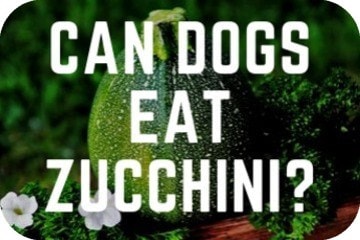
Can dogs eat zucchini? Yes. Dogs can eat zucchini. Zucchini provides dogs with high levels of fiber, vitamins, and minerals. All of the nutrients that a dog needs. Zucchini is well known for its weight loss benefits due to its high levels of fiber but low levels of calories. It will keep your dog feeling full for longer without them eating vast amounts of food.
Busy? Get Your Hands Paws On The Answers Quickly…
- Is Zucchini Good For Dogs?
- How Much Is Too Much?
- Preparing Zucchini For Your Dog – Raw Or Cooked?
- What Vegetables Can Dogs Eat?
- FAQs
IS ZUCCHINI GOOD FOR DOGS?
Yes, very much so! Zucchini chunks or bites can be an excellent replacement for dog treats that are high in calories, especially during the puppy training stage where treats are non-stop! As described above, zucchini has high levels of fiber which provides your dog with the ideal nutrients it needs. Zucchini also helps with your dogs’ digestive system and has been known to reduce or limit any cholesterol problems that may occur. Zucchini is full of potassium, folate, and Vitamin A, which is a necessity for keeping muscles hydrated and healthy.
High In Antioxidants
Zucchini is rich in antioxidants. These antioxidants are excellent for dogs as it benefits their eyesight, skin and heart. It may also help with the prevention of some types of cancer.
Vitamin A
Incorporating vitamin A into a dog’s diet will help maintain your dogs’ shiny coat, muscle strength, and visibility through the night. Broccoli provides 12% of vitamin A towards your dogs’ daily recommendation (22 to 47 IU per KG of dogs weight). Other foods that include vitamin A are; carrots, spinach, and cooked sweet potatoes.
Improved Digestive System
Zucchini is a great source of fiber. Fiber improves a dog’s digestion and excretion of food. Foods rich in fiber ensure a dog feels full while consuming a low amount of calories, perfect for an overweight dog following a strict dietary program.
Increased Immunity
Zucchini provide excellent levels of vitamin C, which helps with your dogs’ immunity; it also helps with the strengthening of their bones and muscles. If your dog has a deficiency of vitamin C, this can cause scurvy. Scurvy causes things such as anemia, urinal bleeding, swollen & discolored gums. HOW MUCH IS TOO MUCH?
Unfortunately, there is such a thing of having ‘too much,’ in my case its pizza! In regards to zucchini and dogs, it should be an alternative treat option, and your dog should be on a ‘zucchini only diet.’ Although it’s not harmless to your dog, there have been times where too much zucchini has caused some digestive complications. Just like other foods, you should take extra precaution and monitor your dogs’ response to zucchini when incorporating into their diet, in case they are allergic or intolerant.
PREPARING ZUCCHINI FOR YOUR DOG – RAW OR COOKED?
Both. Dogs will enjoy a zucchini treat, whether it has been cooked or given to them straight from the fridge. If you’re preparing your zucchini, be sure not to mix it with any seasoning. Chop the zucchini into chunks, small enough to swallow. This will help prevent any choking hazards that may occur. The zucchini can be cooked, boiled, or steamed.
Alternative Ways To Serve Zucchini:
Zucchini Ice Cubes
We have recently purchased ice cube trays to treat our dog. They have been excellent and provided an alternative way to treat our golden retriever. At times, we mix the zucchini with other foods such as chicken, add some water, and you’re ready to freeze!
Baked Zucchini Bones
Using this recipe, you can make zucchini bones. They’re a delicious alternative to chunks of zucchini and are ideal as that “one-off spoilt treat.”
Zucchini Chews
This is a great way to give your dog a chew without going to the shop and buying some. It’s also much healthier and half the price. Bonus! This is the recipe I use.
WHAT OTHER VEGETABLES CAN DOGS EAT?
There are a wide variety of vegetables that dogs can eat. Just like zucchini, other vegetables provide dogs with vast amounts of nutrients that their bodies need. However, some vegetables are not suitable for dogs. These include; Onions, garlic, wild mushrooms, avocado, and rhubarb. The table below shows the top 10 vegetables to include in a dogs diet, voted by dog experts throughout the USA.
The Top 10 Vegetables To Include In A Dogs’ Diet
| Vegetable | Protein (per 100g) | Fiber (per 100g) | Fat (per 100g) |
| Asparagus | 2.2g | 1.2g | 0.1g |
| Broccoli | 2.8g | 2.6g | 0.4g |
| Carrots | 0.93g | 2.8g | 0.2g |
| Green Beans | 1.8g | 3.4g | 0.1g |
| Button Mushrooms | 3.1g | 1g | 0.3g |
| Parsley | 3g | 3.3g | 0.8g |
| Pumpkin | 1g | 0.5g | 0.1g |
| Cooked Sweet Potato | 1.6g | 3g | 0.1g |
| Zucchini | 1.2g | 1g | 0.3g |
| Kale | 4.3g | 2g | 0.9g |
Broccoli
Broccoli is an excellent source of nutrients for both dogs and humans. It provides us with vast amounts of protein but at the same time has low levels of fat, carbohydrates, and sugar. Broccoli also provides dogs & humans with vitamins A, B-6, and C as well as iron and calcium.
Vitamin A
Incorporating vitamin A into a dog’s diet will help maintain your dogs’ shiny coat, muscle strength, and visibility through the night. Broccoli provides 12% of vitamin A towards your dogs’ daily recommendation (22 to 47 IU per KG of dogs weight). Other foods that include vitamin A are; carrots, spinach, and cooked sweet potatoes.
Vitamin B6
This helps dogs to control their hormones, specifically those related to thyroid issues. Moderate consumption levels of B6 helps dogs with regulating their weight and water levels as well as helping to maintain a healthy heart. Other foods that provide significant levels of B6 include; fish, turkey, chicken, and wholegrain rice.
Calories
Broccoli is a great treat for your dog, as it is very low in calories (34). The usual treats most owners buy from pet stores can be high in fat and calories. Therefore, this reduces the number of recommended treats your dog should have each day. If you replace these with broccoli treats, you can increase the number of treats or portions however they shouldn’t feel the need to eat more
Sugar
Just like most vegetables, broccoli has quite a low level of sugar. This is key; providing dogs with sugary foods can have serious implications. If you feel your dog has diabetes or a sugar-related illness, it’s advisable to seek assistance from a local vet regarding your dogs’ dietary requirements.
Fiber
Monitoring your dogs’ fiber intake isn’t a necessity. However, moderate levels of fiber have shown to help with a dog’s digestive system.
Carrots
Carrots are an excellent snack for dogs due to them being super nutritious and easily affordable. Cooked or raw carrots are full of nutritious vitamins and minerals, including; vitamin A & B6, fiber, potassium, and biotin.
Frozen carrots are a great teething tool for young pups who have discomforting teeth pain. You can also give frozen carrots to older dogs; this will act as a chew toy and improve their dental health.
Pumpkin
Pumpkin is not only an excellent source of nutrients it is also recommended by most veterinarians as a cure for diarrhea and constipation in dogs. Pumpkins contain high levels of fiber and beta carotene, once digested, they are converted in to vitamin A.
Fresh pumpkin is an excellent choice for dogs, but due to their seasonal growing; it is not always available. If you can’t get your hands on fresh pumpkin, you can always buy tins, however, you should read the labels and avoid added sugars.
FAQS
Is peanut butter bad for dogs?
No. However any peanut butter containing xylitol or chocolate shouldn’t be given to your dog. Peanut butter is an excellent source of protein and healthy fats but should be moderated, of course.
Can dogs eat bread?
Yes. Plain white bread is generally safe for dogs and is ideal for a treat from time to time.
Can dogs eat bananas?
Yes. Bananas are a great treat as an alternative to a high fat, and salty shop bought treats. However, you should keep track of how much banana your dog has. Too much potassium can cause digestive complications.
Can dogs eat cooked broccoli?
Yes. Dogs can eat both raw and cooked broccoli.
Can dogs eat watermelon?
Yes. However, make sure the seeds and rind are removed. Find more information from our Watermelon Blog Post.
Looking for more pawsome posts? Check these out…
Can Dogs Eat Lettuce?
How To Make A Snuffle Mat
When Do Puppies Lose Their Teeth?
Can Dogs Eat Broccoli?
Can Dogs Eat Cherries?
Disclaimer: Each dog is different, and every circumstance is different. All efforts have been made to provide accurate information. However, it is not provided by a qualified Veterinarian, Veterinarian Surgeon, or Behaviorist. The information provided is purely educational. The information should not be used as an alternative or substitute for medical care. If you have any health or medical concerns, contact a qualified Veterinary Surgeon or Veterinarian immediately.









No Comment! Be the first one.